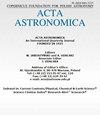Massive Search for Spot- and Facula-Crossing Events in 1598 Exoplanetary Transit Light Curves
IF 2
4区 物理与天体物理
Q2 ASTRONOMY & ASTROPHYSICS
引用次数: 1
Abstract
We developed a dedicated statistical test for a massive detection of spot- and facula-crossing anomalies in multiple exoplanetary transit light curves, based on the frequentist p-value thresholding. This test was used to augment our algorithmic pipeline for transit light curves analysis. It was applied to 1598 amateur and professional transit observations of 26 targets being monitored in the EXPANSION project. We detected 109 statistically significant candidate events revealing a roughly 2:1 asymmetry in favor of spots-crossings over faculae-crossings. Although some candidate anomalies likely appear non-physical and originate from systematic errors, such asymmetry between negative and positive events should indicate a physical difference between the frequency of star spots and faculae. Detected spot-crossing events also reveal positive correlation between their amplitude and width, possibly due to spot size correlation. However, the frequency of all detectable crossing events appears just about a few per cent, so they cannot explain excessive transit timing noise observed for several targets.大规模搜寻1598年系外行星凌日光曲线中的光斑和光斑穿越事件
我们开发了一种专门的统计测试,用于基于频率t p值阈值对多个系外行星凌日光曲线中的光斑和光斑交叉异常进行大规模检测。该测试用于增强我们的过境光线曲线分析算法管道。它被应用于1598个业余和专业的凌日观测,这些观测是在扩展项目中监测的26个目标。我们检测到109个具有统计学意义的候选事件,显示出大约2:1的不对称性,有利于斑点交叉而不是光斑交叉。尽管一些候选异常可能表现为非物理异常,并源于系统误差,但正负事件之间的这种不对称性应该表明星点和光斑频率之间存在物理差异。检测到的斑点交叉事件也揭示了它们的幅度和宽度之间的正相关性,这可能是由于斑点大小的相关性。然而,所有可检测到的穿越事件的频率似乎只有百分之几,因此它们无法解释几个目标观测到的过度穿越时间噪声。
本文章由计算机程序翻译,如有差异,请以英文原文为准。
求助全文
约1分钟内获得全文
求助全文
来源期刊

Acta Astronomica
地学天文-天文与天体物理
CiteScore
3.40
自引率
4.50%
发文量
0
审稿时长
>12 weeks
期刊介绍:
Information not localized
 求助内容:
求助内容: 应助结果提醒方式:
应助结果提醒方式:


